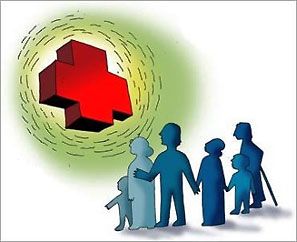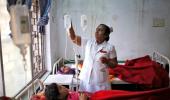Health care costs are rising exponentially and most people are under-insured.
 Most Indians are least prepared for medical emergencies.
Most Indians are least prepared for medical emergencies.
While many of us may have medical cover by way of group health insurance schemes offered by our employers, the amounts are insufficient.
A study conducted by BigDecisions.com, a personal finance advice platform, says about 95 per cent of middle-class Indians do not have adequate health insurance to cover some of the most common procedures and ailments.
The extent of under-insurance is around 60 to 62 per cent in the 25 to 35 and 35 to 45 age groups.
But it is higher (around 69 per cent) in the 45-plus age group, which is the high risk group.
The study is based on data obtained from 10,000 consumers across eight cities, aged between 25 and 45 years and with annual incomes ranging from Rs 6 to 36 lakh.
The low coverage is not due to rise in insurance premia, because in the past five years premia have risen only by three to four per cent.
This is probably because people have bought health cover at some point of time and have not revised it. Or in case of employer sponsored coverage, the cover has stagnated, points out Gaurav Roy, co-founder and chief operating officer of BigDecisions.
The study says healthcare cost in India is seeing double-digit inflation and costs will catch up with other developed countries.
But the percentage of claims paid or reimbursed vis-a-vis the bill amount is falling, especially in case of amounts above Rs 3 lakh.
“Many Indians who have full-time jobs believe that the insurance coverage provided by their employer is sufficient enough and doesn't need to be supplemented. Consumers are paying large sums out pocket as a result of being under-insured at a time when they need insurance protection the most, that is, when facing large treatment bills,”' says the study.
“While statistics may say 22 per cent of the Indian population is insured, this is largely on account of the various government schemes. Actually, less than five per cent of Indians have insurance. Out of this, two-thirds have less than adequate insurance. Today, any major medical procedure will cost at least Rs 3 lakh in a private hospital. And if it is a corporate hospital costs will be higher due to multi-disciplinary treatment and cross referrals,” says S Prakash, executive director, Star Health Insurance.
According to the survey, insurance coverage across cities and across age groups barely touched Rs 3 lakh.
As against this the actual insurance requirement ranged from Rs 4 lakh to Rs 9 lakh, depending on the age group and city. This was arrived at on the basis of information about consumers' family, income, city, etc.
In order to figure how much health cover you need, the broad parameters to keep in mind are age and gender of family members and the city you live in.
“You should check your health cover once in three years at least. And revise it every time there is a change in your family situation, such as the birth of a child or the passing away of an elderly family member,” says Roy.
In addition to employer-sponsored cover, one can also buy top-up covers that are cheaper than regular medical insurance policies and increase the cover amount.
One should also have a rainy day fund that can be used in case of a medical emergency, which should ideally cover six months of financial commitments. You can invest in bank fixed deposits or liquid funds for this.
“While buying health insurance, one can get tax exemption up to Rs 25,000. This too should be factored in the cost because you are effectively paying lesser for the insurance,” adds Roy.











